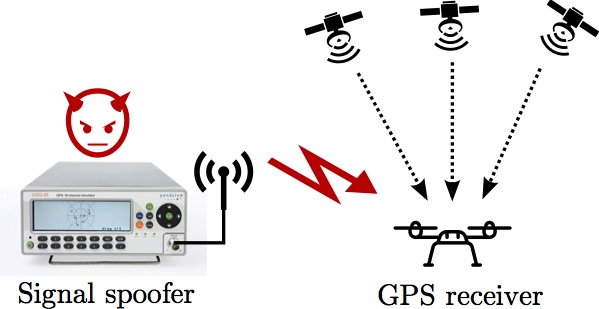
About us
With the development of new location-based services and the expected deployment of cyber-physical systems (e.g., autonomous cars and drones) the reliance on location and time information in critical applications will only increase. Today's positioning systems are vulnerable to location spoofing by which devices can cheat on their own positions or can manipulate the measured positions of other devices. Proximity-based access control systems are insecure against man-in-the-middle relay attacks (e.g., passive keyless entry system in automobiles, contactless access and payment cards). This problem cannot be fixed by a simple upgrade - existing positioning systems rely on legacy distance measurement techniques and protocols that were designed without security considerations or with security as an after-thought. For more than a decade, we in the System Security Group at ETH Zurich have been designing secure technologies to address these issues. More details >>
Securing Satellite-based Navigation Systems

Today, it is possible to spoof a Global Satellite Navigation System (e.g., GPS, Galileo) receiver to any arbitrary location. Check out the video we created to demonstrate how trivial it is to spoof GPS signals today! The increasing availability of low-cost radio hardware platforms make it feasible to execute such attacks with less than few hundred dollars worth of hardware equipment. In this project, we design and develop technologies that secure modern satellite based navigation system against these signal spoofing attacks. More details >>
Secure Positioning
 There is a clear need to develop a new positioning infrastructure that is secure and private by design. Such an infrastructure should provide resilience to location and time spoofing, location verification as well as support, to the full feasible extent, identity and location privacy. We therefore need a new approach to the design of positioning systems that takes security requirements into account from the very start, and also accounts for the way that positioning systems are built and used. In this project, we address fundamental questions related to building secure positioning infrastructure. More details >>
There is a clear need to develop a new positioning infrastructure that is secure and private by design. Such an infrastructure should provide resilience to location and time spoofing, location verification as well as support, to the full feasible extent, identity and location privacy. We therefore need a new approach to the design of positioning systems that takes security requirements into account from the very start, and also accounts for the way that positioning systems are built and used. In this project, we address fundamental questions related to building secure positioning infrastructure. More details >>
Secure Proximity Verification

Proximity information is ubiquitously used in a wide variety of systems. For example, contactless access tokens that use proximity information are prevalent today in a number of applications such as payment systems, hotel keycards, public transportation ticketing to name a few. Even modern automobiles today use proximity based entry systems. The car automatically detects and unlocks when the key fob is in close proximity and there is no need for the user to remove the key from his pocket. Several attacks have already been demonstrated on these systems. More details >>
